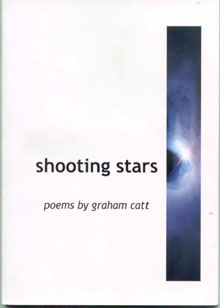 Shooting Stars by Graham Catt
Shooting Stars by Graham Catt
Ginninderra Press, 2001
The debut collection from Adelaide-based poet Graham Catt provides solid proof that sensitivity unleashed can result in quality verse, despite recent factional thinking that posits romantic and emotional reflection as a cheapening of poetic voice.
A courageous and satisfying 96-page collection, Shooting Stars offers its readers an opportunity to swim around in the author's backyard pool and eat toast with the family at the breakfast table. It avoids sinking to sentimental depths, maintaining a measured and consistent approach to each subject as consequences are revealed.
Catt's chosen structure delivers the poetry in five snappy parts. Subjects covered are broad: kitchens, domestic life, relationships, inner pain and childhood. Parts three and four contain the strongest work, dealing openly with the pain and loneliness of separation, and in particular its suddenness. The new life of the single parent is a feature which shows up randomly. And with striking honesty.
The poems tell of the pitfalls which await families in modern times: making ends meet, endless hurrying, conversations which merely nibble at the sides of employment and other day-to-day commitments; that seemingly uncrossable gulf, widening between two lovers, once the art of stimulating communication is lost. The heart stands accused, as many of the poems become trials. Catt sees a cold world, which passes sentence dismissively, insensitively, on a narrator whose only crimes are a desire to express his feelings, engage in his fantasies, and maintain a philosophy of romantic hope.
Too honest and open for a radical feminist to dismiss as mere sour grapes, the poems gathered in Catt's third part are arrows of pain piercing the heart of the book. Here, the poet has recorded poems with sharp endings, blunted satire.
This third part opens with 'Sultana Point', a short piece about a family falling apart while on holiday. It's clear that Graham Catt wishes to ready his readers for a great fall. And what a fall. A graphic and prophetic poem titled 'Accident' falls next, followed by 'Don't Write About Love' and 'Zoo'. And, as shown below, 'Animals' plunges the poetry into a disturbing, primitive jungle that crawls with human love:
they have learned to speak without growling
mastered a language of mirrors and masks
they meet in a crowded room, where individuals
hide desire behind bars, caged by convention
under a feral moon, they remove their disguises
and feast upon each other like true carnivores
Perhaps, however, Catt takes some of his poems a little too far. 'The Tears of a Sensitive Man', while inspiring and rebellious in the context of relationship instability in modern society, seems something of an inevitable and very public ridicule for any man silly enough to get sprung crying at work. He cops it at home as well. While clearly the poem's aimed at extracting sympathy, it fails because it fails because it allows the shallowness to prevail. It crucifies the SNAG.
But Shooting Stars is not all bad news for the sensitive. Cleverly, Catt recovers to impress upon readers a determination to rescue the situation. He redirects his energies towards maintaining the love and respect of his children in the time period following the relationship breakdown.
Catt opens the fourth part of his book with perhaps the most impacting poem in the collection. The short but engaging 'Antarctica' is a powerful, though delicate, recording of the narrator's fourteen-year-old daughter's decision to migrate to the polar continent:
I move to offer comfort, to reach out to her
but she withdraws, turns towards Antarctica;
already I see her eyes freezing over
her smile become cold, her heart turn to ice
In addition to good overall atmospherics throughout this collection, some of the poems possess an almost sinister quality. 'My Wife's Boyfriend' hides a phantom in cupboards, behind doors: Catt's imagery in this poem describes a relationship decayed by adultery, plagued by secrets. And secrets can be scary things. The poet writes them on faces, beneath masks, across hearts; they jump out and assault him when least expected. More shadowy unease follows in 'Entertainment', which dares to suggest that theatre comes second to 'reality' television, and the bedrooms and kitchens of the world are the truest stages.
The final part of Shooting Stars is titled 'Splinters' and consists of poems largely related to Catt's core values: a dutiful and caring regard for the feelings of his young family. 'The Generation Gap' undoes efforts made by the narrator to to understand the need for a teenage girl to occasionally clam up in father-daughter relations. And 'Potato', last in the book, accepts single life and its parental responsibilities, returning readers to the everyday life of the kitchen:
as my thoughts turn in circles
I peel the skin from this potato
slicing through layer after layer
as though in search of some inner truth
and when this one is stripped
I place it to one side, take a deep breath
then, unable to stop myself, I reach for another
Visually, the product is as appealing as the fine verse written within its pages. The cover, and back page, feature some handsome astronomical pics from the photographic archives of NASA. An elegant, clear font presents a text that can easily be digested in a single sitting.
Shooting Stars gives readers a sense of comfort, of confidence in the proud power of emotions. While a number of distinctly weaker poems, sprinkled throughout do cause one to roll the eyes a little, their intervention fails to retard or hinder an almost white-water flow that washes through this collection. Graham Catt is a new poet but one who has shown firm control over some old poetic tricks. His openness will be treasured, his few mistakes forgiven.













